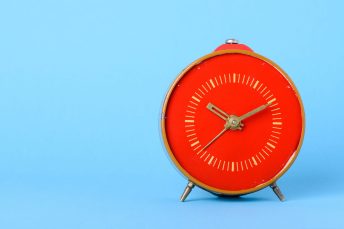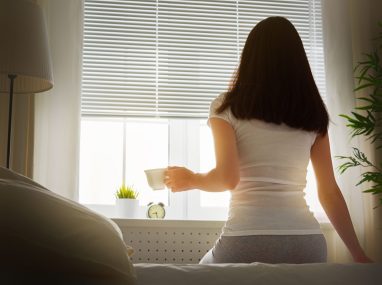Experts warn that COVID-19 is likely to have a detrimental effect on our sleep — in turn posing a major risk to our long-term health and wellbeing
By recognising that sleep is one of the body’s defence strategies, pharmacists can support their own health and wellbeing during COVID-19, as well as that of their patients.
Dr Bei Bei, spokesperson for the Sleep Health Foundation, says, “It’s important to recognise there are many reasons why people have difficulty sleeping or do not sleep well and to identify the underlying cause of sleep problems.”
Certainly, the job losses, school closures, financial stress and uncertainty linked to COVID-19 is highly likely to be having a negative impact on people’s sleep. While self-isolation and social distancing is necessary to help slow the spread of the virus, these measures disrupt the way we operate as human beings.
Adapting to the ‘new normal’
Without the ‘normal’ routines of travelling to work, socialising and taking our kids to school, our body clock can become disturbed. As a result we may experience disrupted sleep patterns, a change in mood, fatigue and altered appetite.
Dr Bandana Saini, professor at the University of Sydney School of Pharmacy and spokesperson for the Australasian Sleep Association explains, “As more people work from home, the normal boundaries of the standard 8am to 5pm day are fast disappearing.
“Being able to access our work from home means we are likely to be working odd hours and losing the socially constructed ‘day and night’ routines. This is even more likely to be the case, as we no longer have our regular sources of entertainment (social gatherings, restaurants and movies, for example).
“Self-isolation may dampen mood and raise anxiety, especially as news about the devastating effects of COVID-19 are repeated through the media.
“For pharmacists, there may be additional factors, such as taking on extra shifts or keeping their pharmacy open longer hours. All of these changes impair the social and biological messages, which normally wind up our circadian clock.”
She explains, “Poor sleep impairs our ability to consolidate memories and leads to daytime fatigue. A healthy sleep period with good quality, consolidated sleep helps the body ‘re-energise’ cellular energy sources, remove toxic cellular bi-products and create a natural complement to daytime activities, where all body systems are usually on high alert and at high performance.
“For example, there are well established rhythmic patterns in concentration of substances such as cortisol (which peaks during the day and reaches its lowest point at night), which allow physiological processes to ‘rest’ at night. Therefore, any imbalance in sleep routines can lead to inconsistency in cortisol patterns and cause stress.
“Certainly, at this time pharmacists may be dealing with added stressors. They’re handling continuing prescriptions and additional paperwork, managing staff, preparing for scenarios where a staff member may be infected with Covid-19, and working longer hours.
“It’s a ‘Catch-22’ situation where the increased stress and stress related hormones keep the mind ‘over-alert’ at night and prevent good sleep.”
She adds, “There is also a strong link between sleep and immunity. Deep sleep stages during the initial sleep cycles promote growth hormone and prolactin release. This hormonal environment then up-regulates antigen presenting cells (APC) and T cells, activates the Th1 pathway and increases T helper cell proliferation.
These initial Th1 pathways lead to long-lasting immunological memories and are, therefore, important. Sleep loss and the ensuing stress response lead to chronic inflammation and a state of immunodeficiency, making us more vulnerable to illness. There have been some preliminary studies indicating that there are circadian patterns in how viral pathogens replicate in the body.”

Supporting a sound night’s sleep
“There are many techniques and lifestyle modifications that promote optimal sleep. Pharmacists and their staff can educate people on the fact that sleeping pills are not the only option and nor are they recommended as first-line therapy,” says Dr Bei.
“Pharmacists can discuss how to prepare for sleep, ways to create a positive sleep environment and how to help regulate the sleep cycle through good sleep habits. This can be particularly useful for someone experiencing sleeping difficulties for the first time, due to anxiety or insecurity related to the coronovirus.
“Getting up around the same time every day and going to sleep only when sleepy—these two things are possibly the most important steps to take to assist a good night’s sleep.
“However, people need to understand why they need to do these things otherwise they will not stick to them. Getting up at the same time every day helps to stabilise the body clock. It is the initial daily exposure to light that resets your circadian rhythm.”
Dr Saini says, “As bedtime approaches, it is important to wind down (as this is what the body is naturally aiming to do during sleep). Carrying out relaxing activities close to bedtime are good sleep signals.
Proactive sleep health behaviours, such as not drinking caffeine after 3pm, not eating meals too close to bedtime and avoiding alcohol, are also beneficial.
“The bedroom environment needs to have no stimuli (i.e. no devices). If after 20 minutes you still haven’t fallen asleep, an important rule is to get out of bed and do something boring until you feel cued to go back to sleep. This helps the brain condition itself to the notion of bed being associated with sleep (stimulus control).
“Also, it’s good to have a high sleep efficiency (proportion of time in bed that is spent asleep). Sleep efficiency is calculated by dividing total sleep time by total time in bed. Sleep efficiency of 80% or greater is considered normal.
“For example, if a person spends 9 hours in bed and sleeps for 7.5 of those hours, they have an 83% sleep efficiency.
“If sleep efficiency is low, try to ‘match’ time in bed to the actual time spent asleep, even if this means sleeping later (sleep restriction). Both stimulus control and sleep restriction are well known behavioural therapies, which are part of CBT-I (cognitive behavioural therapy for insomnia—considered first-line treatment for insomnia), and can be formally tried with a trained clinician.
“There are good apps that can help record sleep timings and may be useful in self-regulating sleep patterns.”
Natural aids & supplements
“Many people experiencing difficulty sleeping would prefer to try an alternative approach, rather than take a pill. Pharmacists are well placed to advise on evidence-based approaches,” says Dr Bei.
“Unfortunately, there have been very few comprehensive studies into the efficacy of natural remedies in treating sleep problems. Literature reviews suggest there is little evidence to support the use of common herbs such as valerian, chamomile and passionflower in treating insomnia.
However, information provided by the Sleep Health Foundation reveals that in clinical human trials kava, passionflower, and chamomile performed ‘reasonably well’ in reducing anxiety, which can affect sleep.
“What’s more, it is noted that many herbal remedies can take time to take effect. For example, valerian may take two to three weeks to yield an improvement.”
Aside from managing treatment expectations, pharmacists also have an essential role to play in discussing the potential safety issues and possible side effects. The Sleep Health Foundation advises that studies suggest it could be unsafe to use Kava with benzodiazepines, found in many sleeping tablets.
Dr Bei advises, “Despite the lack of evidence, a herbal remedy may be perceived as “natural” and low risk. We need to consider how much the person is taking, whether they have any pre-existing conditions and whether these supplements are actually doing any harm.”
With regards to melatonin, a known sleep aid that’s available over-the-counter in the US but is schedule 4 in Australia, she says, “This is a circadian and sleep-timing hormone. It’s used to treat body clock disorders or circadian rhythm issues, but when we use it in this way it’s important to time the melatonin really well.
“A typical example of someone who has a delayed body clock is a teenager who happily sleeps in until 1 or 2 in the afternoon but really struggles to get up at 8 or 9am.
“With cases like this we use a very small dose (often 0.5mg) of melatonin, just enough to give the brain a signal. The timing of melatonin is critical for shifting body clock, and it is best to work with a trained clinician for doses and timing.
“As well as the timing, the dosage is also important, as a higher dose of 2mg or above is likely to produce a hypnotic effect. However, it is the hypnotic effect that some people rely on to encourage them to fall asleep.
While this may be helpful for some people in managing their sleep, just because melatonin has few side effects and is not as addictive as other sleep aids—it doesn’t mean people won’t develop some psychological dependency on it.
“In this instance, the person may perceive their sleep becomes externally controlled and regulated by a drug. Without the drug the person cannot sleep, which is why advising on non-drug sleep practices in the first place is useful.”

Non-drug strategies
Dr Bei says prioritising sleep is always important, but perhaps even more so in the current climate.
“It’s essential that all frontline health professionals take measures to support their own sleep, as well as that of their patients.
She offers the following strategies to help support the body’s natural daily rhythms.
Get up at the same time every day. Your get-up time is like an anchor to your day and night. Keeping a consistent get-up time will help other parts of your day fall into a regular routine and help you sleep better the next night.
Welcome in the morning light. Our brain’s body clock (or circadian pacemaker) is tuned by daily light. Morning bright light, when received by our brain at around the same time every day, is a powerful time signal of our body clock. Bright light has the added benefit of promoting alertness, which is particularly important if you find it difficult to get going in the morning.
Eat meals around the same time. Eating serves as a timekeeper and helps tune our body clock. Eating meals at the same time of the day supports a healthy biological clock, which is important for sleep.
Exercise daily. It’s important to take care of your body and exercise goes hand in hand with self-care. Regular daily exercise, ideally at around the same time each day, may also be helpful in managing fatigue.
Find time to unwind. Spend some time relaxing for at least an hour before bed. This helps prepare your body and mind for rest and sleep.
Dim the lights and ditch devices before bed. A dark environment can help your body naturally produce melatonin and prepare your body for sleep. To block out blue light from electronic devices, turn the screen brightness to the lowest setting and turn on Sleep Mode or Night Shift.
Only attempt sleep when sleepy. Do not try to sleep when you are alert, fully awake, or distressed. If it is your bedtime and you are feeling this way, take more time to unwind your body and mind before trying to sleep.
Dr Bei says, “Right now we’re all going through a difficult time. It’s important to understand that it’s normal to have a few bad nights of sleep; it isn’t necessarily indication
of a sleep disorder.”


